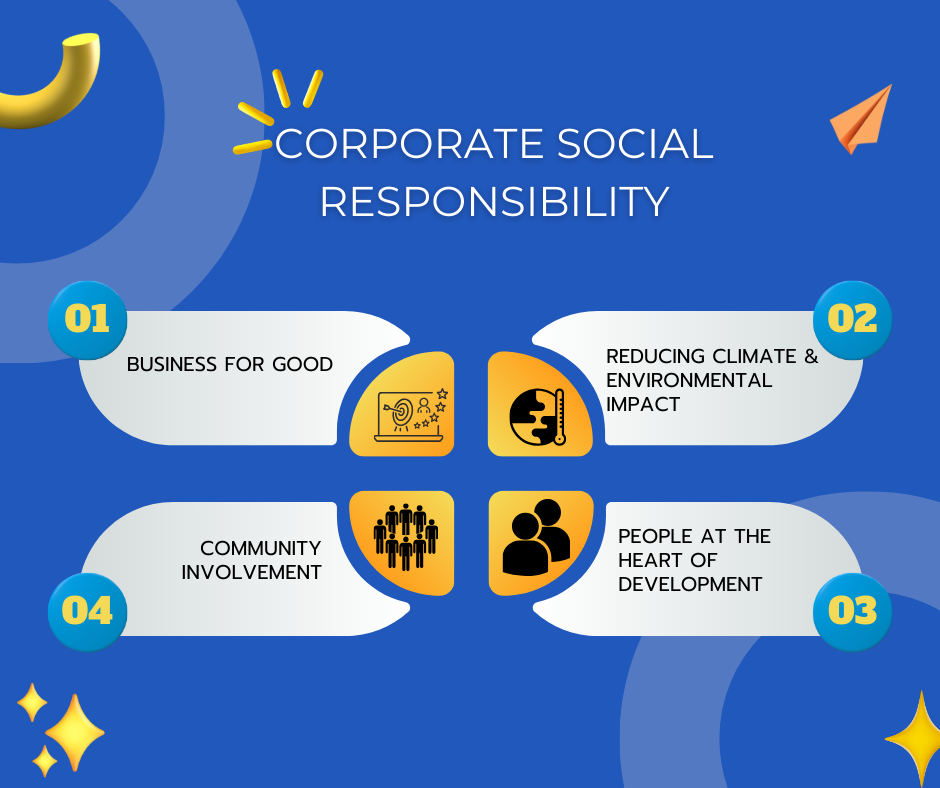Contact: +91 99725 24322 |
Menu
Menu
Quick summary: Explore corporate sustainability responsibilities and initiatives that drive positive environmental and social impact. Learn how businesses are taking action to build a sustainable future.

Today Corporate Sustainability Responsibilities is a fundamental shift in how businesses operate and interact with the world. In recent years, the concept of corporate sustainability has gained unprecedented traction and its importance continues to grow exponentially. It is no longer enough for organizations to merely focus on profits, they are increasingly expected to be responsible stewards of the environment, mindful of social impacts and committed to sound governance practices.
According to HBS Online, 77% of consumers are motivated to purchase from companies committed to making the world a better place, while 73% of investors state that efforts to improve the environment and society contribute to their investment decisions.
This blog post aims to delve into the intricacies of corporate sustainability, exploring the various initiatives and corporate responsibility efforts undertaken by businesses. As we embark on this exploration, we will uncover the multifaceted dimensions of corporate sustainability showcasing how businesses are integrating sustainability initiatives into their core strategies to create a better, more equitable and sustainable future for all.
Corporate Sustainability is a transformative vision that shapes how organizations operate in the modern world. It is about achieving a harmonious balance between economic success, social responsibility and environmental stewardship. To break it down, it encompasses:
This component focuses on minimizing a company’s negative impact on the environment. It involves reducing resource consumption, decreasing pollution and mitigating climate change by adopting eco-friendly practices, sustainable sourcing and energy-efficient technologies.
This component emphasizes on the well-being of employees, communities and societies at large. It involves promoting diversity and inclusion, ensuring fair labor practices, supporting local communities and fostering ethical behaviour.
This component revolves around transparent, ethical and accountable corporate governance. It encompasses effective board leadership, adherence to regulatory standards, responsible management and protection of shareholder rights.
Corporate Sustainability has gained unparalleled significance due to the following reasons:
Sustainability efforts enhance a company’s reputation and brand value. Consumers and investors increasingly prefer businesses that demonstrate commitment to environmental and social causes.
Sustainable practices help companies to anticipate and mitigate risks including environmental, regulatory and reputational risks.
Sustainability fosters innovation and efficiency that drives long-term competitiveness. These practices result in improved resource management, reduced costs and a stronger position in market.
In an evolving regulatory landscape where governments are stringent about environment and social regulations, embracing sustainability ensures compliance, reducing legal and financial risks.
Investors today incorporate ESG ( Environmental, Social and Governance) criteria into their decision making process. Companies committed to sustainability are more likely to attract responsible investors.
Corporate sustainability is integral to securing a company’s long-term viability. It aligns business strategies with global challenges, fostering resilience in th efface of evolving environmental and social issues.
Corporate Sustainability is today a strategic imperative that empowers businesses to thrive in a rapidly changing world, while contributing to society and the planet.

Environmental sustainability is a critical aspect of corporate responsibility and companies worldwide are increasingly recognizing the importance of reducing their environmental impact.
Sustainable Supply chains are an integral component of an organization’s environmental strategy that focuses on reducing the ecological impact of a business’s operations, products and services.
Companies can prioritize sourcing raw materials and products from suppliers who adhere to sustainable and ethical practices. This includes sourcing from suppliers who minimize deforestation, avoid child labour and practice fair trade.
It also includes Local sourcing which would reduce the carbon footprint associated with transportation by sourcing materials locally wherever possible. Transparency in the supply chain is crucial. Companies are adopting blockchain technologies to trace the origins of products and ensure they come from environmentally responsible sources.
Carbon Accounting is a critical aspect of environmental sustainability and corporate responsibility. It involves measurement, reduction and offsetting of carbon emissions produced by an organization’s activities.
Organizations assess their carbon footprint by quantifying the greenhouse gas emissions associated with their operations, including direct emissions (Scope 1 ), indirect emissions for purchased energy ( Scope 2) and other indirect emissions ( Scope 3 )from supply chain activities. Gathering data on energy consumption, fuel use, transportation and other emission sources is crucial for accurate measurement.
Integrating electric or hybrid vehicles and optimizing transportation routes can significantly reduce fuel consumption and emissions, contributing to the reduction of air pollution and greenhouse gas emissions.
Implementing energy management systems to continuously monitor and optimize energy usage, investing in renewable energy sources like solar and wind power to reduce reliance on fossil fuels helps companies to achieve carbon neutrality.
Companies can reduce waste by implementing practices like lean manufacturing which minimizes overproduction and waste generation. Recycling and reuse of materials within the organization should be encouraged throughout the supply chain. Incorporating circular economy principles, where products and packaging are designed for reuse, remanufacturing or recycling aligns with the environmental strategy’s goal of reducing waste.
Social responsibility is a fundamental pillar of corporate sustainability focusing on an organization’s ethical and responsible treatment of its employees, engagement with local communities and efforts to make a positive social impact.
Companies promote diversity by recruiting individuals from different backgrounds, ethnicities, genders and abilities. They also foster inclusivity and provide training, resources and support to ensure that all employees feel valued and included.
Companies engage with local communities through volunteer programs, partnerships with non-profits and initiatives that address community needs. The companies also prioritize physical and mental well-being of employees and encourage work-life balance.
Companies allocate funds to support causes aligned with their values contributing to philanthropic efforts. Organizations engage in projects that address social and environmental challenges such as clean energy initiatives, sustainable agriculture and align initiatives with the UN’s Sustainable Development Goals.
Companies ensure that suppliers adhere to ethical labor practices including safe working conditions and fair wages. They also source materials from suppliers who uphold social responsibility standards.
Companies provide clear and transparent information on social responsibility efforts in sustainability reporting and disclosures. Measuring and reporting on social impact indicators is important.
Social responsibility initiatives align with broader sustainability goals and demonstrate a commitment to responsible business practices, fostering long term success.
Governance and ethical practices are vital components of corporate sustainability, emphasizing responsible leadership, adherence to regulatory standards and transparent, ethical decision making.
Leaders must model ethical behaviour, integrity and a commitment to values that prioritize environmental and social responsibility. The board of directors have to be accountable for the organization’s sustainability goals.
Ensuring compliance with local, national and international environmental laws and regulations such as emission standards, waste disposal regulations and conservation laws is crucial. There is a need to also adhere to financial reporting and disclosure requirements related to sustainability metrics and performance.
The company needs to provide transparent and comprehensive sustainability reports that disclose the ESG
performance data, goals and progress. This would also entail engaging with stakeholders and involving them in the decision-making process.
Identifying and addressing ethical and governance risks that could impact the organization’s reputation, financial stability and operations is also important.
Accountability and Reporting play a central role in ensuring that organizations uphold their commitments and communicate their progress to stakeholders.
Accountability is the cornerstone of building and maintaining trust with stakeholders, including investors, customers, regulators and employees. Being accountable allows organizations to identify and address sustainability risks effectively. This helps to mitigate potential issues including financial and reputational risk.
Reporting is a fundamental element of a business’s sustainability strategy. It serves as a means for companies to exhibit transparency and accountability to a range of stakeholders including customers, investors, regulators and employees. This transparency aids in establishing trust and credibility and nurtures a favourable reputation.
Sustainable Reporting plays a pivotal role in enabling companies to recognize and manage risks associated with ESG. It serves as a catalyst for innovation by identifying opportunities for advancement and investment in sustainable solutions. This results in development of new business models, products and services that are in harmony with sustainability objectives, creating value for the company.
Sustainability Reporting might also be obligatory due to legal and regulatory requirements. Within the European Union, large corporations are mandated to disclose information about their sustainability performance as outlined in the non-financial reporting directive. This is succeeded by the Corporate Sustainability Reporting Directive (CSRD)
ESG reporting entails the presentation of information pertaining to a company’s activities in the three domains of Environmental, Social and Corporate Governance. It serves as a overview of how the business affects these three aspects, offering valuable insights to potential investors. The assessment of a company’s performance across these ESG factors involves consolidating both quantitative and qualitative data, facilitating the evaluation of investment opportunities.
Sustainability reporting frameworks and standards guide organizations in collecting and reporting relevant ESG data consistently. By adhering to these frameworks, organizations can communicate their sustainability efforts effectively, benchmark their performance against peers and demonstrate their commitment to corporate responsibility and accountability in the world of corporate sustainability.
The key standards and frameworks include:
It provides guidelines for reporting on various sustainability aspects, including environmental impact, social responsibility and governance.
This focuses on industry- specific standards that help organizations report on material ESG factors relevant to their sector.
This focusses specifically on climate-related disclosure. It expects companies to report their carbon emissions, climate strategies and risks.
This provides recommendations for climate-related financial disclosures , helping organizations to assess and report their climate-related risks and opportunities.
Many organizations align their sustainability reporting with specific SDGs to demonstrate their contribution to global sustainability challenges.
Trace Carbon – TraceX’s sustainability and carbon management solution empowers companies to achieve their corporate sustainability initiatives by providing comprehensive tools for tracking, managing and reducing their environmental footprint. With Trace Carbon, businesses can monitor their carbon emissions, set reduction targets and implement strategies to minimize their impact on the environment. This technology enables companies to make informed decisions, improve resource efficiency and meet sustainability goals, contributing to a more sustainable and responsible future. Furthermore, the solution offers robust reporting capabilities, allowing companies to transparently communicate their sustainability efforts to stakeholders and regulatory bodies. This reporting enhances accountability and demonstrates a commitment to corporate sustainability initiatives.
Sustainability initiatives and corporate responsibility will continue to shape the business world by driving innovation, fostering trust among stakeholders, enhancing brand reputation and ensuring long-term viability. Companies that proactively embrace these trends and integrate sustainability into their core strategies are posed to thrive in a rapidly changing global landscape where environmental and social considerations are central to business success.
Emerging Trends
In conclusion, corporate sustainability and responsible initiatives have evolved from being optional to becoming essential elements of modern business strategies. Embracing sustainability not only benefits the environment and society but also strengthens a company’s competitive advantage, fosters innovation, attracts investors and builds trust among stakeholders.
